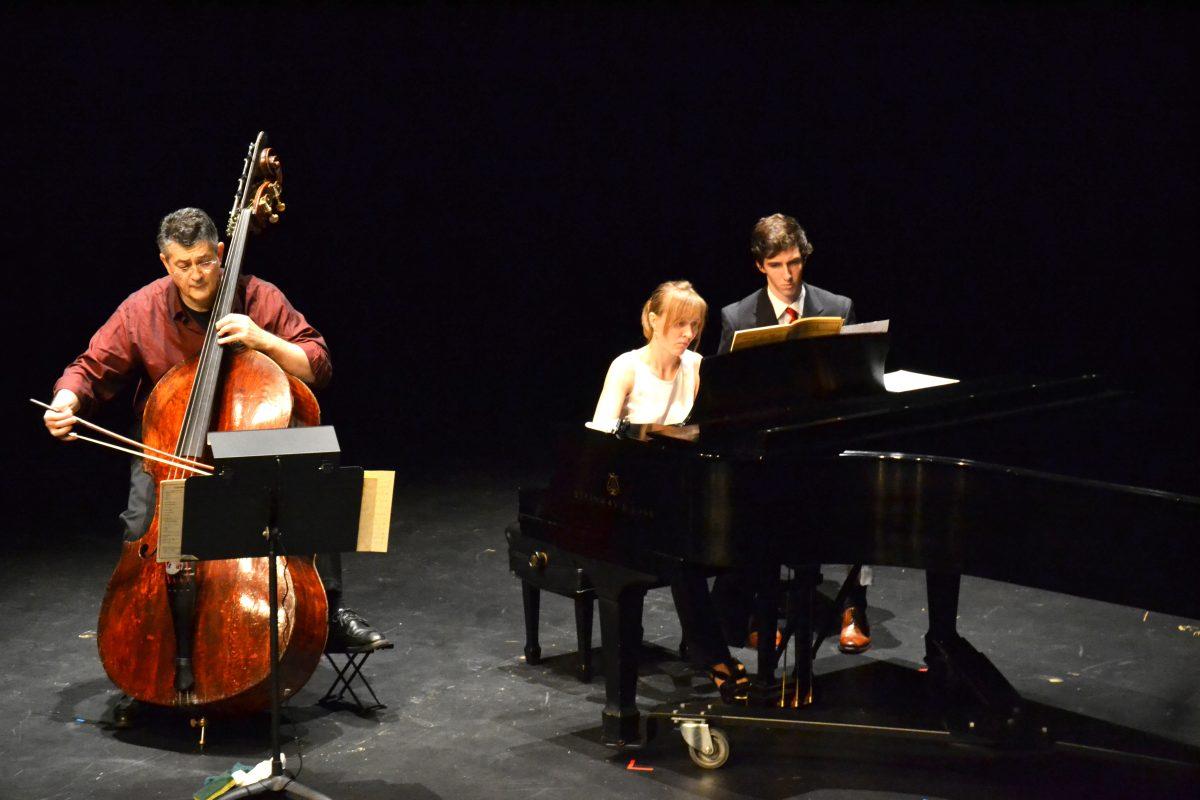
Victoria Crocker
Dr. Olga Kleiankina plays the piano with guest artist Leonid Finkelshteyn playing the double bass in Thompson Hall, Sunday, Nov. 3, 2013. Guest artist Anatoly Larkin also played the piano in the second half of the recital. Photographed by Victoria Crocker.
A member of the N.C. State faculty joined other Raleigh-based performers for a recital in Thompson Hall on Sunday.
The Olga Kleiankina Piano Faculty Recital featured piano and double bass arrangements from the group.
“I hope that students enjoyed my events, and they will be attracted to future performances,” said Kleiankina, assistant professor of piano at N.C. State.
Kleiankina accompanied Leonid Finkelshteyn who played the double bass and performed pieces by artists such as Adolf Mišek, Sergei Rachmaninoff and Giovanni Bottesni.
“I enjoyed the performance as it was technically proficient and wonderful musically,” said Greg Song, a sophomore in business.
Kleiankina said she has one recital every semester and will perform soon at an event featuring Beethoven’s music on Nov. 17, at Meymandi Concert Hall. Finkelshteyn is the principal bassist for the North Carolina Symphony and the Eastern Festival orchestra. He has toured with the Chicago Symphony, New York Philharmonic and Philharmonia Hungarica.
Kleiankina performed “Carnival of the Animals” with pianist Anatoly Larkin. Larkin is from Russia and has studied and written music since the age of four. He has studied at the Guildhall School of Music and Drama in London and moved to Raleigh in 2005 to work with music technology company Zenph.
“I always try to pick pieces that will be interesting to the audience, so I knew they would like to do ‘Carnival of the Animals,’” Kleiankina said.
A narrator read sections of a poem by Ogden Nash such as “Introduction and Royal March of the Lion,” “Hens and Cocks,” “The Aquarium” and “Tortoises” that described that type of animal. After that, the pianists would perform a piece from Camille Saint-Saëns’ “Carnival of the Animals.” The pianists performed each part of the piece as pictures of animals were displayed from a projector and the narrator read the poem.
A finale featured tunes that tied in sounds and styles of the previous songs and received a loud ovation from the audience.
The audience gave each performance an ovation, especially after the “Carnival of the Animals” performance, because of the unique set up of the pianos and style of the song.
According to the Kennedy Center’s website, Saint-Saëns originally didn’t intend on showing the public his piece and only intended on using it to entertain his friends, but after being published it became one of his most popular works. His score originally called for a dozen instruments to be played, but the performance by Kleiankina and Larkin was by piano alone.
Two pianos were set up beside each other so both pianists could see each other while they performed together. According to David Jones, a technical director at Titmus Theatre, both pianos had to be put next to each other so each keyboard could be tuned simultaneously.
“It was rare and different for a performance to have the two pianos set up next to each other and positioned so each artist can see each other,” Jones said.
Kleiankina has played the piano for 27 years. She has performed with orchestras from Moldova, Romania, United States and Russia.
In 2010, Kleiankina debuted a piano concerto written by N.C. State composer Rodney Waschka in Russia.